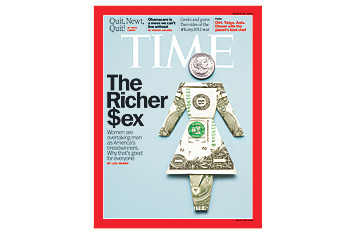
(5 of 7)
In the face of women's rising power and changing expectations, many men may experience an existential crisis. When the woman takes on the role of primary breadwinner, it takes away an essential part of many men's identity: that of the provider, the role he was trained, tailored and told to do since he could walk and talk. His heroes are likely all successful in this area. As long as he is the primary breadwinner, it often excuses whatever he may lack in EQ, for failing to engage in long meaningful conversations or spend more time with the kids. He is too busy killing it at work. So when you take that away, men have nowhere to turn for guidance. There's no map through that wilderness.
So that adjustment will not come easily. They can resist and retaliate--and some do. As the late Whitney Houston noted in a 2009 interview with Oprah Winfrey, it can be toxic when partners are in the same field and the woman emerges as more successful. "I think somewhere inside, something happens to a man when a woman has that much control or has that much fame ... if he doesn't have his own," she said. Alternatively, men can give up. But there is a third option, in which men rise to the challenge, trying harder in the classroom, competing with women but in a good way. It means adapting but also broadening the definition of masculinity to include new skills and pleasures. Hunting but also cooking. Golf but also child care. We are always too quick to think masculinity is finished. As far back as the 1950s, historian Stephanie Coontz has pointed out, Look magazine announced "the decline of the American male."
So far, the keepers of popular culture don't sound much more optimistic. In 2010 the Atlantic magazine announced "the end of men" with a provocative cover story whose theme was echoed in books with titles like Man Down and Manning Up and movies and TV shows that depict men drowning in their irrelevance--coverage that raised important issues but dwelled on men's failure to adapt to a new world order. Judging by their tireless efforts to smooth the way forward, women appear to doubt the ability of men to handle the changes ahead. Successful women can go to extravagant lengths to conceal the stature gap. One university vice president admitted that when she was dating, she took pains not to let men walk her to her car, for fear her BMW might make them feel inadequate. When men asked what she did for a living, she would vaguely say she worked in administration. A doctor at a Midwestern hospital said she never put her salary or even her profession in her online-dating profile. A group of young women in Atlanta devised more-elaborate ruses: One entrepreneur owns a car, and her boyfriend does not; when they go on an excursion, she makes some excuse for why she'd rather he drive and tosses him the keys. Another, after staying over at her boyfriend's apartment, quietly restocks his pantry. Still another buys movie tickets in advance and says they were given away at work. A Washington-area software consultant says men even in that well-educated city can be put off by her geek credentials, so at the outset she tells romantic prospects she teaches music.
